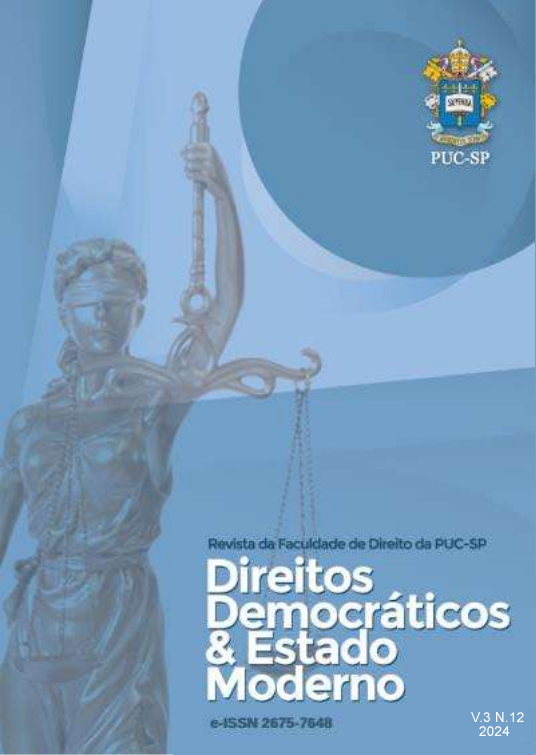Ethics in arbitration and its challenges as well as reflections on its hybrid nature
DOI:
https://doi.org/10.23925/ddem.v.3.n.12.67508Keywords:
Urgency Precautionary Guardianship, Cautelar Process, New Brazilian Civil Procedure Code, UrgencyAbstract
The Arbitration Law (Lei nº 9.307/96) is intended for the Brazilian legal system to regulate arbitration as a method of conflict resolution, alternative to the Judiciary. In short, the legal nature of arbitration is beyond debates and divergences in documents and jurisprudence. Although Law 9,307/96 does not expressly define the legal nature of arbitration, it presents characteristics that allow it to be classified as a hybrid institution, with elements of jurisdiction and contract. On the one hand, arbitration is subject to state jurisdiction, producing decisions by force of judicial ruling, binding the parties and their successors. Furthermore, the arbitral ruling can be executed directly, without the need for judicial approval. On the other hand, arbitration may have a strong contractual nature, as it originates from the parties, expressed in a contract (commitment clause or arbitration agreement). The parties have wide freedom to choose the arbitrators, the procedure and the law applicable to the case. Given these characteristics, arbitration can be understood as a form of private jurisdiction, exercised by arbitrators appointed by the parties, based on a contract. This hybrid nature of arbitration is what confers flexibility, efficiency and autonomy, making it an attractive alternative for conflict resolution.
References
ALENCASTRO, Mario Sérgio Cunha. A importância da ética na formação de recursos humanos. São Paulo: Fundação Biblioteca Nacional, n. 197.147, livro 339, 1997.
ARANHA, Maria Lúcia de Arruda; Martins MARIA Helena Pires. Filosofando: Introdução à Filosofia. 4 ed. São Paulo: Moderna, 2009.
BARROCAS, Manuel. Arbitragem voluntária deve aliviar tribunais. in Vida Judiciária. Porto: Editorial Peixoto de Sousa. N. 45 (2001) p. 5-9
CAHALI, Francisco José. Curso de arbitragem: mediação, conciliação, Resolução CNJ 125/ 2010. 2. ed. São Paulo: Revista dos Tribunais, 2012.
CHAUÍ, Marilena. Convite à Filosofia. São Paulo: Ática, 1998.
CONTRERAS, José. A autonomia de professores. Tradução: Sandra Trabucco Valenzuela. São Paulo: Cortez, 2002.
CORTELLA, Mário Sérgio. Qual é a tua obra? Inquietações, propositivas sobre gestão, liderança e ética. Petrópolis: Vozes, 2009.
CRETELLA NETO, José. Curso de Arbitragem: arbitragem comercial, arbitragem internacional, Lei brasileira de arbitragem, Instituições internacionais de arbitragem, Convenções internacionais sobre arbitragem. 1ª Edição. Rio de Janeiro: Ed. Forense, 2004, p. 15.
CRETELLA NETO, José. Curso de arbitragem. 2. Ed. Campinas: ed. Milennium. P. 45. 2009.
CRETELLA NETO, José. Quão sigilosa é a arbitragem? Revista de Arbitragem e Mediação, v. 7, n. 25, p. 43-70, abr./jun. 2010.
ENRIQUEZ, Eugène. Os desafios éticos nas organizações modernas. Revista de Administração de Empresas, São Paulo: FGV-EAESP, v. 37, n. 2, p. 6-17, abr./jun. 1997.
FIGUEIRA JÚNIOR, Joel Dias. Arbitragem, Jurisdição e Execução. São Paulo: Editora Revista dos Tribunais, 1999, p. 85.
GAIO JR., Antonio Pereira. Teoria da Arbitragem. 1ª Edição. São Paulo: Ed. Rideel, 2012, p. 19.
KLARE, Karl E. The Public/Private Distinction in Labor Law. Source: University of Pennsylvania Law Review, Vol. 130, No. 6 (Jun. 1982), pp. 1358-1422. Disponível em < https://www.jstor.org/stable/3311975> Acesso em: 09 JUL. 2024
GOULD, William B. Labor Arbitration of Grievances Involving Racial Discrimination.University of Pennsylvania Law Review, Vol. 118, No. 1 (nov., 1969), p. 40-68 Disponível em <https://www.jstor.org/stable/3311125> Acesso em: 09 jul. 2024
LAMAS, Natália Mizrahi. Introdução e princípios aplicáveis à arbitragem. In: LEVY, Daniel (coord). Curso de Arbitragem. São Paulo: Thomson Reuters Brasil, 2018. P. 58
MARCO, Carla Fernanda de. Arbitragem internacional no Brasil. São Paulo: RCS, 2005.
MOORE, George Edward. Princípios Éticos. São Paulo: Abril Cultural, 1975.
NALINI, José Renato. Ética geral e profissional. 4. ed. São Paulo: Revista dos Tribunais, 2014.
NERY JUNIOR, Nelson. Princípios de Processo Civil na Constituição Federal. 8. ed. São Paulo: RT, 2009.
PRETTI, Gleibe. Aplicação da arbitragem nas relações trabalhistas. Disponível em https://portal.unimar.br/site/public/pdf/dissertacoes/53082B5076D221F668102851209A6BBA.pdf>. Acesso em: 09 jul. 2024
ROQUE, André Vasconcelos. Novos paradigmas e perspectivas para a arbitragem de dissídios individuais no direito do trabalho. Disponível em: <http://www.publicadireito.com.br/artigos/?cod=6cc6e45d2f9cf66f> Acesso em: 26 dez. 2021
ROQUE, Sebastião José. Arbitragem a solução viável. São Paulo: ed. Ícone, 1997.
SANTOS, Mario Vitor. Os pensadores, um curso. Rio de Janeiro: Casa da Palavra. São Paulo: Casa do Saber, 2009.
SAVIANI, Demerval. Pedagogia histórico-crítica. Campinas: Autores Associados, 2003.
SCHMIDT, Gustavo da Rocha. Comentários à Lei de Arbitragem. São Paulo: Método, 2021
SOARES, Guido F. S. A arbitragem e sua conaturalidade com o comércio internacional. In: PUCCI, Adriana Noemi (Cood) Aspectos atuais da arbitragem. Rio de Janeiro: Forense, 2001, p. 121-134.
VELÁSQUEZ, Manuel G. Business ethics: concepts and cases. 4. ed. Upper Saddle River, NJ: Prentice Hall, 1998.
Downloads
Published
How to Cite
Issue
Section
License
Copyright (c) 2024 Democratic Rights & Modern State

This work is licensed under a Creative Commons Attribution 4.0 International License.
This work is licensed under a License Creative Commons Atribuição 4.0 Internacional.
The authors grant the journal all copyrights relating to the published works. The concepts issued in signed articles are the absolute and exclusive responsibility of their authors.
DD&EM Magazine - ISSN 2675-7648

















